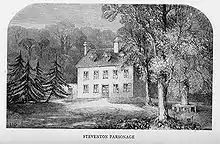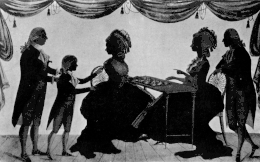George Austen (cleric)
George Austen (1731–1805) was a cleric of the Church of England, rector of Deane and Steventon in Hampshire. He is known as the father of Jane Austen.[1]
Early life
Austen was the son of William Austen, of Tonbridge, Kent.[2] He and his sister Philadelphia[3] were orphaned when George was nine years old, and he was taken under the wing of his wealthy uncle Francis Austen.[4] He attended Tonbridge School and St John's College, Oxford.[2][5]
After matriculating at St John's on 2 July 1747, aged sixteen, Austen graduated BA on 12 February 1751, promoted to MA by seniority in 1754. He was a proctor in 1759 and graduated as a Bachelor of Divinity in 1760.[2]
Career

In 1764, the living at Deane was purchased for Austen by his uncle Francis.[4] The living at Steventon was "given to him by his cousin Mr. Knight".[4]
Toward the end of 1800, Austen retired and the Steventon living was transferred to his son James. With his wife and daughters Cassandra and Jane he went to live in Bath, Somerset, and died there in 1805.[6]
His granddaughter Anna Lefroy later recalled:
I have always understood that he was considered extremely handsome, and it was a beauty which stood by him all his life. At the time when I have the most perfect recollection of him he must have been hard upon seventy, but his hair in its milk-whiteness might have belonged to a much older man. It was very beautiful, with short curls about the ears. His eyes were not large, but of a peculiar and bright hazel. My aunt Jane’s were something like them, but none of the children had precisely the same excepting my uncle Henry.[6]
Marriage and family

Austen met Cassandra Leigh while he was a student at Oxford.[7] They married in 1764 and began their married life living in the rectory at Deane; in 1771 they moved to Steventon Parsonage, the birthplace of their daughter Jane. They had eight children:
- James Austen (1765–1819)
- George Austen (born 1766)
- Edward Austen Knight (1767–1852)
- Henry Thomas Austen (1771–1850)
- Cassandra Austen (1773–1845)
- Sir Francis Austen (1774–1865)
- Jane Austen (1775–1817)
- Charles John Austen (1779–1852)
Their second child, George Austen, suffered from severe epilepsy, and did not grow up in the family home.[7]
Austen's wife came from a clerical family, with links to St John's College, Oxford,[7] and was able to claim descent from one of the college founders, giving her sons the right to attend the college without paying for tuition, as founder's kin.[5] James and Henry Thomas Austen both attended St. John's College.[8][9]
References
- Feldman, Paula R. (2001). British Women Poets of the Romantic Era: An Anthology. Johns Hopkins University Press. ISBN 9780801866401. Archived from the original on 20 June 2021. Retrieved 20 December 2019.
- Foster, Joseph (1888–1892). . Alumni Oxonienses: the Members of the University of Oxford, 1715–1886. Oxford: Parker and Co – via Wikisource.
- Amy, Helen (2013). Jane Austen. Amberley. ISBN 9781445615738. Archived from the original on 20 June 2021. Retrieved 20 December 2019.
- Austen-Leigh, James Edward (1871). Memoir of Jane Austen (Second ed.). London: Richard Bentley and Son. Archived from the original on 19 December 2019. Retrieved 20 December 2019.
- Collins, Irene (5 February 2003). Jane Austen and the Clergy. A&C Black. p. 20. ISBN 978-1-85285-327-3.
- Constance Hill, Jane Austen: Her Homes and Her Friends (London: John Lane, 1904), p. 31
-
Marilyn Butler (7 January 2010). "Austen, Jane: (1775–1817)". Oxford Dictionary of National Biography. doi:10.1093/ref:odnb/904. ISBN 978-0-19-861412-8. Archived from the original on 12 November 2020. Retrieved 20 February 2021.
The boys qualified, on Cassandra's side, as 'founder's kin' at St John's College, which entitled them against competition to free tuition.
- Foster, Joseph (1888–1892). . Alumni Oxonienses: the Members of the University of Oxford, 1715–1886. Oxford: Parker and Co – via Wikisource.
- Foster, Joseph (1888–1892). . Alumni Oxonienses: the Members of the University of Oxford, 1715–1886. Oxford: Parker and Co – via Wikisource.